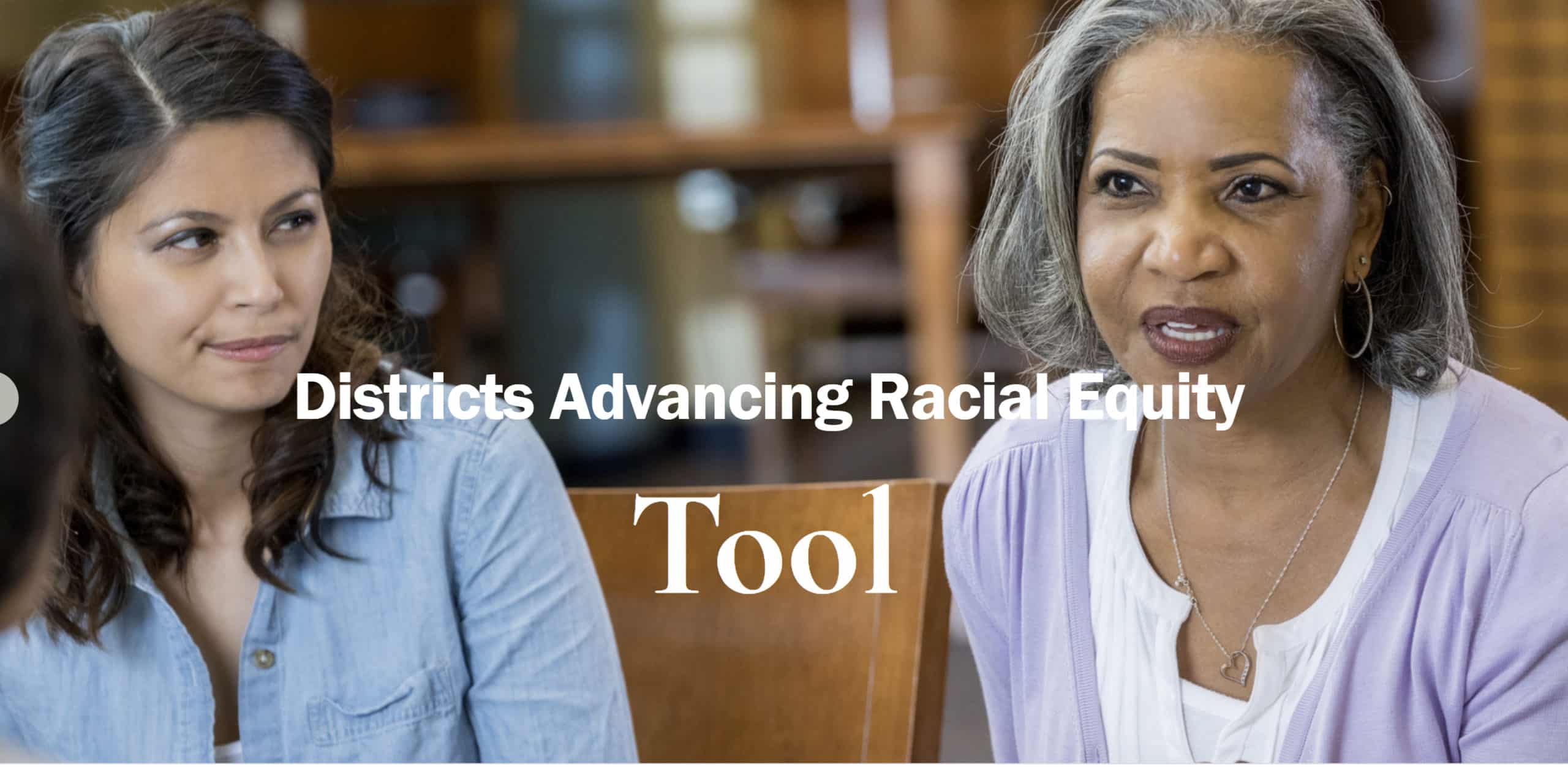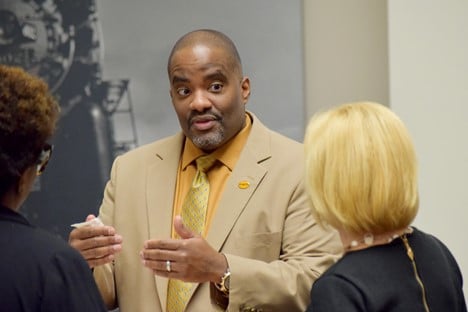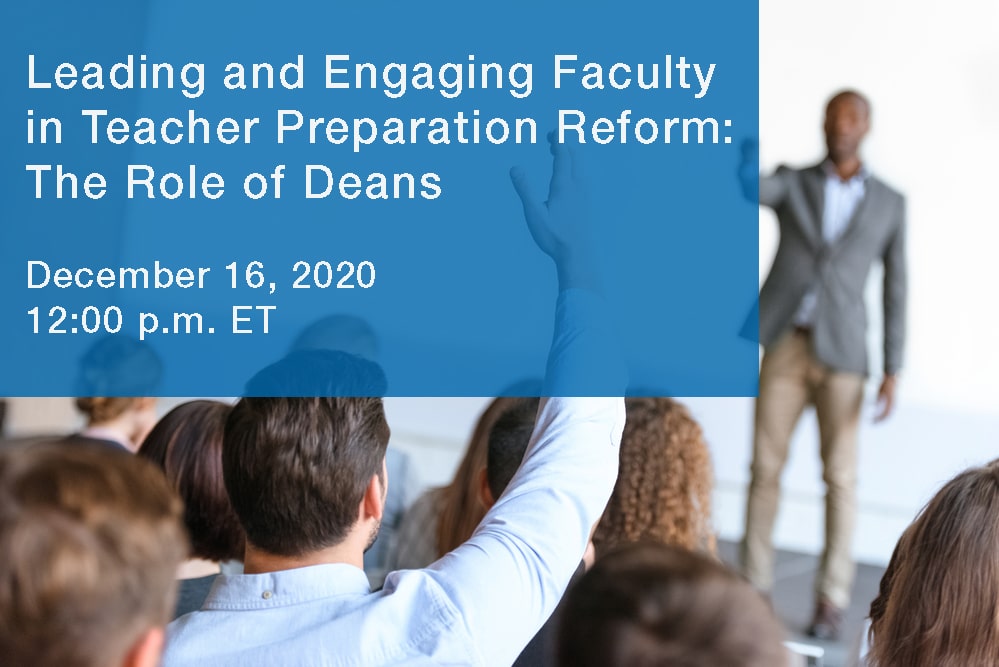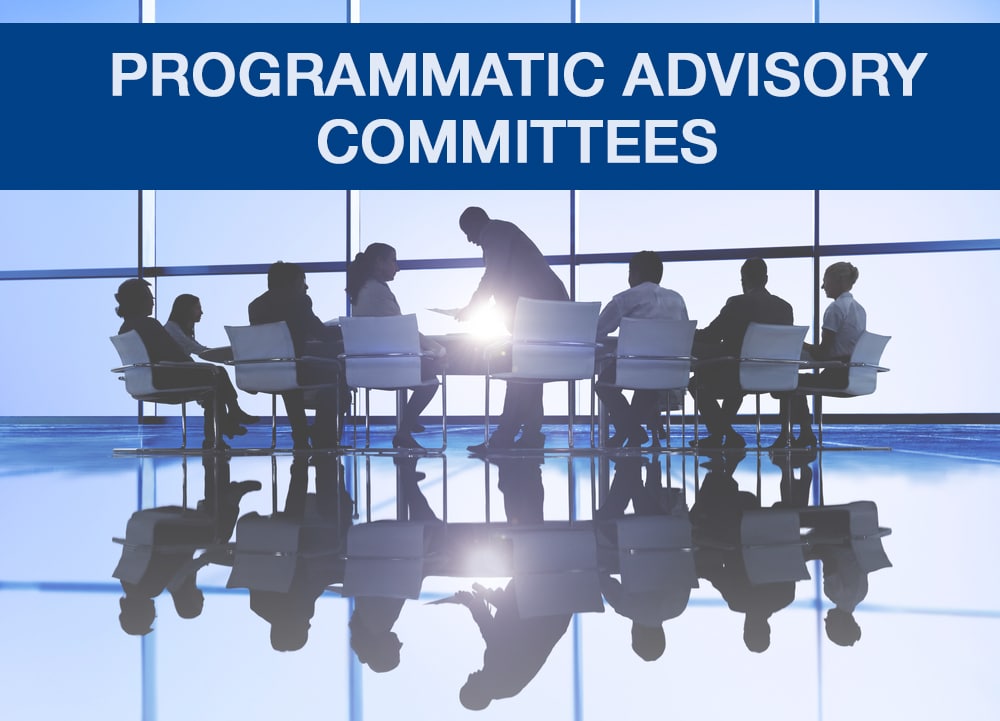25 Jan2021
By Weade James
 AACTE is pleased to announce the Call for Applications for the Consortium for Research-Based and Equitable Assessments (CREA). Funded by the Bill and Melinda Gates Foundation, the purpose of the Consortium is to convene stakeholders across various states to (1) examine how cut scores for entrance into educator preparation programs are currently set, (2) identify guidelines and recommendations for setting equitable cut scores for Praxis I and similar assessments, and (3) develop model state policies that seek to attract and prepare diverse teacher candidates for the profession.
AACTE is pleased to announce the Call for Applications for the Consortium for Research-Based and Equitable Assessments (CREA). Funded by the Bill and Melinda Gates Foundation, the purpose of the Consortium is to convene stakeholders across various states to (1) examine how cut scores for entrance into educator preparation programs are currently set, (2) identify guidelines and recommendations for setting equitable cut scores for Praxis I and similar assessments, and (3) develop model state policies that seek to attract and prepare diverse teacher candidates for the profession.
The Consortium of state teams shall be comprised of educator preparation programs and representatives from state and local education agencies. Participants must commit to one full year of participation, which will include quarterly meetings and pre-work between meetings to accomplish the goals of the Consortium.
19 Jan2021
By Maria Hyler

This article originally appeared on the Learning Policy Institute website an is reprinted with permission. The article was written by Maria E. Hyler, Desiree Carver-Thomas, Marjorie Wechsler, and Larkin Willis.
Decades of reforms have proven insufficient to address persistent racial disparities in educational opportunities. In school systems across the United States, meaningful efforts to ensure access to strong educational opportunities require a bold and significant shift. Policies and practice must not only prevent discrimination; they must move beyond simple notions of equality—in which every student gets the same—to equity—in which all students get what they need to develop academically, socially, emotionally, and physically.
School leaders who have been committed to racial equity understand the historical legacy of structural racism that reaches to our present context and that results in the educational opportunity gaps that students still experience. District staff who have focused on racial equity recognize that students’ individualized experiences, opportunities, and successes in school are deeply contextualized in the social reality of institutionalized racism across the United States. They seek to educate the individuals and ameliorate the systems that perpetuate inequitable opportunities and resulting outcomes for students.
13 Jan2021
By Brian McNeill

This article originally appeared in VCU News and is reprinted with permission.
Andrew P. Daire, Ph.D., dean of the School of Education at Virginia Commonwealth University, was appointed Wednesday as a co-chair of Virginia’s new advisory committee charged with making recommendations on culturally relevant and inclusive education practices in Virginia’s public schools.
The Culturally Relevant and Inclusive Education Practices Advisory Committee, which was established by the General Assembly during the 2020 session, held its inaugural virtual meeting Wednesday and Gov. Ralph Northam announced its leadership and members.
“Inclusive and culturally relevant learning environments are vital to creating equitable pathways to success for all Virginians,” Northam said in a news release. “The work of this committee will advance our ongoing efforts to tell the complete and accurate story of Virginia’s complex past, improve our history standards, and give educators opportunities to engage in important conversations and lessons with their students.”
06 Jan2021
By Susan Baker

This article is part of a series that originally appeared on the Education First Blog and is reprinted with permission.
Here in the College of Education at California State University Sacramento, we’ve been in the business of preparing teachers for 73 years, and in the past few years have prepared approximately 380 teachers annually across 12 certification areas. A central aspect of our offerings across these programs is a focus on helping candidates understand the relationship between societal inequities and student learning, with special focus on race, class, gender, and other socially constructed categories. We knew that these understandings were key to our candidates’ success in developing equitable, healthy relationships with their K-12 students.
But we found that this wasn’t enough. The mentor teachers who support our candidates in their clinical experiences started asking us faculty some tough questions about whether these aspects of our preparation really prepared our candidates to be ready to teach all children on day one. Was the preparation coherent and clear for candidates? Were candidates provided opportunities to practice the ways in which teachers cultivate equitable, culturally responsive anti-racist classroom environments?
05 Jan2021
By AACTE
AACTE has launched a new initiative to examine state-level teacher certification assessment scores, with the goal to improve equitable and inclusive practices for promoting a diverse educator workforce. The initiative, funded by the Bill & Melinda Gates Foundation, will enable AACTE to develop national guidelines and recommendations for state education leaders in establishing criteria for equitable evaluations for teacher candidates seeking state licensure.
“Left uninterrogated, standardized tests of any sort tend to spur inequalities, rather than resolve them,” said Leslie T. Fenwick, AACTE dean in residence. “If entrance exams are decimating the ranks of prospective pre-service teachers of color, we have a moral and practical obligation to correct the outsized impact of these tests on the future of our profession.”
17 Dec2020
Increase Focus on Technology and Commitment to Equity and Diversity
By Matt Vanover
 The Council for the Accreditation of Educator Preparation (CAEP) Board of Directors has approved changes to the 2013 CAEP Standards for educator preparation. The CAEP Standards guide the nation’s top schools of education, those that are CAEP accredited, in preparing future K-12 teachers. The changes the Board approved include streamlining language, strengthening emphasis on technology, equity, and diversity. The revised standards are in effect for providers with visits in spring 2022.
The Council for the Accreditation of Educator Preparation (CAEP) Board of Directors has approved changes to the 2013 CAEP Standards for educator preparation. The CAEP Standards guide the nation’s top schools of education, those that are CAEP accredited, in preparing future K-12 teachers. The changes the Board approved include streamlining language, strengthening emphasis on technology, equity, and diversity. The revised standards are in effect for providers with visits in spring 2022.
“The changes to the standards maintain our commitment to continuous improvement for our organization and our providers. The CAEP Standards were developed in 2013 to unify the profession under a single set of standards, with a commitment to ensure they remain rigorous. The enhancement to the standards is based on research to ensure rigor and relevance,” said CAEP President Christopher A. Koch. “CAEP providers are committed to preparing graduates that are ready to teach all students on the first day they enter a classroom.”
14 Dec2020
By Pamela Carroll

Did you know that over 1,000 traditionally underrepresented doctoral students have benefitted from the AACTE Holmes Scholars Program? Through networking, collaboration, mentoring, leadership opportunities, and research activities, the program provides high-achieving minority students with rich professional development. In fact, you probably know a former scholar, as many are now in tenured faculty and leadership positions at institutions across the United States.
Educator preparation programs (EPPs) are keenly focused on developing strategies to advance the field of education, close the equity gap, and make a more diverse teacher workforce a reality, and the Holmes Scholar Program is an essential component to achieving those goals. To promote diversity of the education profession and to prepare educators who can serve diverse learners, the program provides EEPs with the opportunity to attract students from historically underrepresented communities, increase the retention and graduation rates of doctoral students of color, and strengthen the institution’s role as a leader in supporting diversity.
08 Dec2020
By Nicole Dunn

AACTE and CEEDAR (Collaboration for Effective Educator Development, Accountability, and Reform) Center are partnering together to present a webinar centered on a special issue brief, Leading and Engaging Faculty in Teacher Preparation Reform: The Role of Deans. The issue brief summarizes the experiences in leadership of six current and former deans who have been identified as engaging in successful collaborative reform efforts within their colleges.
During the one-hour event, Mary Brownwell will talk with Marquita Grenot-Scheyer and Kandi Hill-Clarke about the issue brief and their experiences of cultivating collaboration and supporting innovation among general and special education faculty who share responsibility to support students in diverse and inclusive classrooms. Since few resources exist to support deans in their efforts to work with faculty to engage in this work, AACTE and CEEDAR believe the experiences of these leaders will be useful to other deans as they work toward similar outcomes.
Register for the webinar, which will take place December 16 from 12:00 – 1:00 p.m. (ET). Learn more about the panelists:
04 Dec2020
By Jacob Easley II
This article originally appeared in Diverse Issues in Higher Education and is reprinted with permission.
 The 1787 U.S. Constitution was ratified to establish justice, liberty, and prosperity, but not for all Americans. Like the Constitution, early American educational practices were based on a system of whiteness and elitism. Justice and prosperity for those who comprise marginalized groups have remained largely unfulfilled. We know for certain that we are a pluralistic society. No one group has singularly built this nation, secured its borders, nor defended its values. The plurality of our nation is our strength. As educators, particularly who prepare America’s future teachers, we must double down, now more than ever, on what Horace Mann said, “Education, beyond all other devices of human origin, is the great equalizer of the conditions of men, the balance wheel of the social machinery.”
The 1787 U.S. Constitution was ratified to establish justice, liberty, and prosperity, but not for all Americans. Like the Constitution, early American educational practices were based on a system of whiteness and elitism. Justice and prosperity for those who comprise marginalized groups have remained largely unfulfilled. We know for certain that we are a pluralistic society. No one group has singularly built this nation, secured its borders, nor defended its values. The plurality of our nation is our strength. As educators, particularly who prepare America’s future teachers, we must double down, now more than ever, on what Horace Mann said, “Education, beyond all other devices of human origin, is the great equalizer of the conditions of men, the balance wheel of the social machinery.”
America has yet to become an equal society, and these societal ills create the need for scholar activism embedded in Critical Race Theory (CRT), which historically documents and names the atrocities carried out in this country in the name of freedom, liberty, and democracy. America’s struggle to uphold the Constitution for all its citizens makes it necessary to examine the structural oppression that encumbers the United State from fully living up to its democratic ideals. Through CRT, scholars across higher education have researched racial inequality that emerged from the social, economic, and legal differences created between races to maintain elite, white interests in this country. If our national laws and practices are to ensure justice and equity, then educators have a great deal of work to do in ensuring the American ideals we teach youth to value in school are a reality for all.
04 Dec2020
By Marni Kay
In 2017, several Elementary Education faculty members came together to create the University of Central Florida (UCF) Lake County Teacher Knights program, which was designed to support students who were graduating from the UCF South Lake Campus as they navigated their first few years in the classroom. Each month, the faculty members host evening professional learning sessions (with dinner) for these first through third year teachers. Additionally, they have partnered with Lake County Schools professional development department to host workshops on topics of the teachers’ request.
Now in year four, Lake County Teacher Knights are reflecting on a question many senior interns and recent graduates ask themself before that first day in their senior placement or their first classroom … “What do I need to know?” Well, here is what this group of dedicated and talented teachers want to share with future senior interns and new career teachers, shared with love and hope for a brighter teaching future.
Here is their A-Z list of everything you wished you knew …
01 Dec2020
By Katrina Norfleet

In a recent interview with AACTE, Gaëtane Jean-Marie, dean and professor of educational leadership at the College of Education, Rowan University, discusses the importance of preparing teacher candidates to understand the cultural background of students in moving toward a more humanistic approach to see the learner as an individual.
Why is it important to prepare teacher candidates in culturally responsive classroom management?
It is to really realize the belief that all children can learn. A while back when I was teaching as a faculty member, I remember DuFour’s comment that stayed and resonates with me; it is that, “if we truly believe that all children can learn, what then do we do when they can’t, when they are not learning?” It makes me ask: What is our responsibility to help bridge the cultural gap between teachers and students? As we continue to help diversify the teaching profession, it is still predominantly white teachers who are the educators, so how do we prepare them? What’s the responsibility of ensuring that our teacher candidates can really meet the needs of all learners? Given the demographic shift, where more of our Black and Brown children are in schools and will be taught by teachers who are not of the same race. If we are recognizing that it starts with the belief that all children can learn, then our belief must also align with our practices as we continue to work hard to diversify the profession. We espouse the belief that all children can learn; now let’s realize that dream.
30 Nov2020
By Amber Benedict, Linda Blanton, Mary T. Brownell and Jane E. West
 AACTE is proud to partner with the CEEDAR (Collaboration for Effective Educator Development, Accountability, and Reform) Center to bring you a webinar focused on a special issue brief, Leading and Engaging Faculty in Teacher Preparation Reform: The Role of Deans, on December 16, 12:00 – 1:00 p.m. ET.
AACTE is proud to partner with the CEEDAR (Collaboration for Effective Educator Development, Accountability, and Reform) Center to bring you a webinar focused on a special issue brief, Leading and Engaging Faculty in Teacher Preparation Reform: The Role of Deans, on December 16, 12:00 – 1:00 p.m. ET.
The issue brief summarizes the experiences in leadership of six current and former deans who have been identified as engaging in successful collaborative reform efforts within their colleges. AACTE and CEEDAR look to their experiences to support leaders, like you, in understanding the actions they took and the strategies they employed that may be useful to other leaders of educator preparation programs (EPPs) who are committed to restructuring curricula and programs in their own settings.
17 Nov2020
By Deen Lango

This article originally appeared in the USBE Information Technology magazine and is reprinted with permission.
Although minorities make up more than half of the student population in public schools, people of color make up about 20 percent of teachers. More than 70 percent of the total number of teachers are female. With support from the Education Writers Association, Chandra Thomas Whitfield took a close look at the shortage of Black male teachers in 2019. Nationwide, Whitfield found that only 2 percent of teachers are Black men.
Eleven months after Whitfield’s report, Alabama A&M University launched its Males for Alabama Education initiative to recruit Black male students who have an interest in teaching.
In October 2020, the Males for Alabama Education (M.AL.E.) Initiative announced that the scholarship program is accepting applications again.
Coordinated by the College of Education, Humanities and Behavioral Sciences and its Department of Teacher Education and Leadership, the M.AL.E. Initiative aims to:
16 Nov2020
By Jacqueline E. King, Ph.D.

At its September meeting, the AACTE Board of Directors appointed new members to the programmatic advisory committees, including two new committees on Educator Diversity and the Holmes Program. Congratulations to these AACTE members, who will assume these positions on March 1, 2021, and a special thank you to everyone who submitted a nomination for these important volunteer leadership roles.
02 Nov2020
By JTE Insider
This podcast interview features insights from the article “Education Policy and Black Teachers: Perspectives on Race, Policy, and Teacher Diversity” by Terrenda White, Brian Woodward, DaVonna Graham, H. Richard Milner, and Tyrone C. Howard. The article is published in the September/October 2020 of the Journal of Teacher Education. AACTE members have free access to the articles in the JTE online archives—log in with your AACTE profile.
 AACTE is pleased to announce the Call for Applications for the Consortium for Research-Based and Equitable Assessments (CREA). Funded by the Bill and Melinda Gates Foundation, the purpose of the Consortium is to convene stakeholders across various states to (1) examine how cut scores for entrance into educator preparation programs are currently set, (2) identify guidelines and recommendations for setting equitable cut scores for Praxis I and similar assessments, and (3) develop model state policies that seek to attract and prepare diverse teacher candidates for the profession.
AACTE is pleased to announce the Call for Applications for the Consortium for Research-Based and Equitable Assessments (CREA). Funded by the Bill and Melinda Gates Foundation, the purpose of the Consortium is to convene stakeholders across various states to (1) examine how cut scores for entrance into educator preparation programs are currently set, (2) identify guidelines and recommendations for setting equitable cut scores for Praxis I and similar assessments, and (3) develop model state policies that seek to attract and prepare diverse teacher candidates for the profession. 









 The Council for the Accreditation of Educator Preparation (CAEP) Board of Directors has approved changes to the 2013 CAEP Standards for educator preparation. The CAEP Standards guide the nation’s top schools of education, those that are CAEP accredited, in preparing future K-12 teachers. The changes the Board approved include streamlining language, strengthening emphasis on technology, equity, and diversity. The revised standards are in effect for providers with visits in spring 2022.
The Council for the Accreditation of Educator Preparation (CAEP) Board of Directors has approved changes to the 2013 CAEP Standards for educator preparation. The CAEP Standards guide the nation’s top schools of education, those that are CAEP accredited, in preparing future K-12 teachers. The changes the Board approved include streamlining language, strengthening emphasis on technology, equity, and diversity. The revised standards are in effect for providers with visits in spring 2022. 

 The 1787 U.S. Constitution was ratified to establish justice, liberty, and prosperity, but not for all Americans. Like the Constitution, early American educational practices were based on a system of whiteness and elitism. Justice and prosperity for those who comprise marginalized groups have remained largely unfulfilled. We know for certain that we are a pluralistic society. No one group has singularly built this nation, secured its borders, nor defended its values. The plurality of our nation is our strength. As educators, particularly who prepare America’s future teachers, we must double down, now more than ever, on what Horace Mann said, “Education, beyond all other devices of human origin, is the great equalizer of the conditions of men, the balance wheel of the social machinery.”
The 1787 U.S. Constitution was ratified to establish justice, liberty, and prosperity, but not for all Americans. Like the Constitution, early American educational practices were based on a system of whiteness and elitism. Justice and prosperity for those who comprise marginalized groups have remained largely unfulfilled. We know for certain that we are a pluralistic society. No one group has singularly built this nation, secured its borders, nor defended its values. The plurality of our nation is our strength. As educators, particularly who prepare America’s future teachers, we must double down, now more than ever, on what Horace Mann said, “Education, beyond all other devices of human origin, is the great equalizer of the conditions of men, the balance wheel of the social machinery.”
 AACTE is proud to partner with the CEEDAR (Collaboration for Effective Educator Development, Accountability, and Reform) Center to bring you a
AACTE is proud to partner with the CEEDAR (Collaboration for Effective Educator Development, Accountability, and Reform) Center to bring you a 
